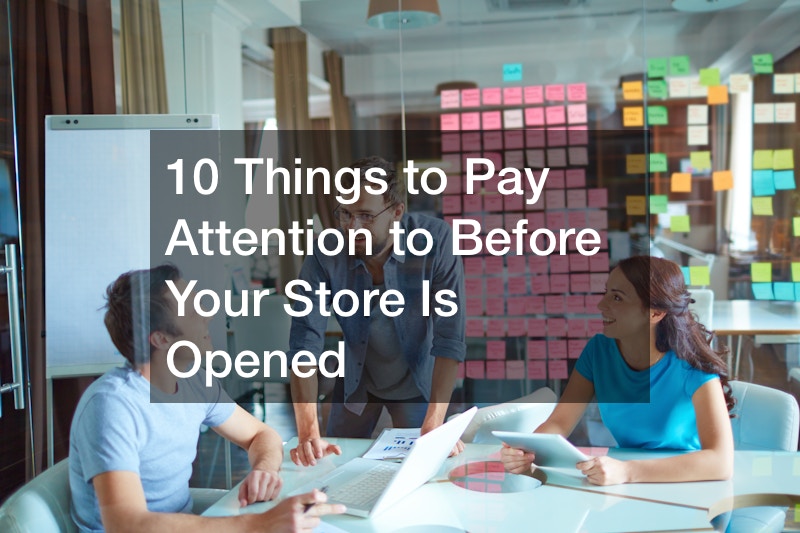
Opening up a store is an exciting venture, as it can present a great opportunity for entrepreneurs to expand and develop their businesses. However, store owners should take certain important steps to ensure that their store is opened in the best possible way.
According to the U.S. Bureau of Labor Statistics data, 50% of businesses fail within the first five years of operations. With this in mind, it pays to pay attention to the details and plan in advance so that your store has the greatest chance of success. This article will outline some of the key considerations to take into account before your store opens.
1. The Furniture

Furniture is the soul of your store; it sets the tone, creates the ambiance, and portrays the character of your business. Therefore, you need to be very thoughtful when selecting your furniture pieces. Here are a few things to pay attention to before your store is opened.
- Style: It’s important to consider the overall look and feel of the furniture pieces you choose. They should fit in with the rest of the decor, so keep your store’s theme in mind when selecting pieces.
- Comfort: You want your customers to relax and enjoy their experience in your store, so ensure the pieces you choose are comfortable and inviting.
- Quality: Since furniture pieces take the brunt of everyday use, you should look for materials and construction that will withstand wear and tear. Ensure you do your due diligence when researching the quality of the pieces from the furniture store you decide to buy from.
- Space: Before deciding on furniture pieces, it’s important to measure the area they’ll occupy and ensure they’ll fit the space without being crowded. Too much furniture can make your store look cramped, while not enough can make it seem empty.
Selecting the right furniture is essential in creating the perfect store atmosphere. These tips will help ensure that you make the right choices for your store and create the perfect space for your customers.
2. The Plumbing
Faulty plumbing can cause thousands of dollars in damage and significant disruption of day-to-day operations. Unfortunately, plumbing is one area that can easily be overlooked when opening a store. When it comes to plumbing systems, it’s crucial to address any potential problems before the store is opened. It’s prudent to hire a professional plumber to thoroughly inspect the premises for any issues that may not be visible to the untrained eye. This includes checking for leaks, cracks, or blockages in the pipes and inspecting the building’s drainage system.
Another area of plumbing to consider is ensuring all fixtures are properly installed and up to code. All toilets, basins, showers, and other plumbing features should function properly and safely. Finally, there must be adequate ventilation in any area with plumbing systems.
No matter how new and updated the building is, a full plumbing system inspection can save time and money later. According to Forbes Home, the average plumbing repair cost is $400. Even the most minor issue can lead to major expenses!
3. The Roof

Many business owners forget to pay attention to one of the most crucial components of business premises: the roof. It’s important to inspect the roof before your store is opened to identify any potential issues with the roof and address them promptly.
It’s also a good idea to regularly schedule roof inspections to ensure the roof is in optimal condition. According to the National Roof Certification and Inspection Association, a roof can easily last up to 50 years, depending on the material — as long as it’s well-maintained. When inspecting the roof of a store, you should check several key areas:
- Check for any visible signs of roof damage, like missing shingles, tears in the roof, or damaged flashings.
- Inspect the roof’s flashing and sealants, as these can deteriorate over time or become displaced due to weather exposure.
- It’s also wise to examine the insulation beneath the roof to ensure it’s in good condition and provides adequate insulation.
Finally, you should hire a professional roofing contractor if you identify any problems with your store’s roof. A qualified roofer has the expertise and resources to provide roof repairs or replacements to ensure your store’s roof is effective, safe, and secure.
4. The Masonry
When venturing into a new store, masonry is one thing to pay particular attention to. Masonry makes up a substantial portion of a building’s construction and is responsible for maintaining a store’s structural integrity and functionality.
Buildings with faulty masonry can suffer from water damage and have higher masonry repair costs in the future, making it essential for store owners to inspect their buildings for existing masonry issues.
Before your store is opened, you should take the time to look at all the masonry surfaces, such as brick, stone, and stucco, as well as all of the various features associated with them, such as sealants, flashing, and mortar joints. For instance, if mortar joints become cracked or moisture is allowed to seep through, erosion of the wall can occur.
Hire a professional to inspect your store’s masonry to avoid masonry issues. It’s also a good idea to clean the masonry regularly, as dirt and debris can trap moisture. If the walls have suffered from erosion or damage, replacing damaged bricks is important to ensure the store’s stability.
5. The Floors

Floors should be one of the first things business owners consider when opening a store. As per the Consumer Product Safety Commission (CPSC), floors and flooring materials are directly responsible for more than two million fall injuries annually. This is why it’s so important to pay careful attention to flooring before your store is opened.
One of the first things to consider is the flooring you’ll use. Many options are available, from polished concrete to linoleum, luxury vinyl tile to hardwood, and everything in between. It’s important to think about the following:
- Type of traffic the floor will be exposed to.
- Ease of cleaning and maintaining the flooring material.
- The overall appearance and cost of flooring.
A reliable flooring service can help you determine which type of surface is the most suitable for your store, whether it be anti-slip, stain-resistant, durable, non-porous, etc., to provide a safe and secure environment.
6. The Windows
As the world of retail continues to grow and change, the importance of displaying products and product lines in attractive, eye-catching windows can’t be understated. That’s why store owners should ensure that their windows bring in business, not turn it away. There are several points of focus when evaluating your store’s window displays:
- The windows should be clean and brightly lit so that customers can clearly see the merchandise offered inside. Filth and darkness are surefire ways to turn customers away.
- Ensure that all windows, including all glass panes, are in good condition and not cracked, chipped, or fogged. To supplement these efforts, keep windows freshly painted and equipped with pleasant signage.
Investing in replacement windows is always a viable option for store owners with larger budgets. A replacement window brings energy savings and performance to a higher level and can contribute to a store’s overall style. This could include opting for various glass windows with intricate designs or even ceramic-coated glass, which provides superior solar control.
No matter how much window display knowledge you may have, it’s important to remember that the windows should always remain aesthetically pleasing and be kept in exceptional condition. Take the time to inspect and maintain the windows before your store is opened because your storefront is the first impression for potential customers.
7. The Air Quality
The little details can make all the difference when running your retail store. One such detail that may be overlooked is the air quality of your store. Poor air quality can turn away potential customers and be a health hazard. According to the EPA, indoor air pollution is now one of the top five public health risks in the United States.
Installing a good quality air conditioning system in your store is one of the first and most important steps to a clean and healthy store interior. Ensure AC installation is done properly, with all necessary filters and vacuum lines in place. This will keep dust and other particles out of the air and provide adequate air circulation in the store.
At the same time, properly maintaining your air conditioning system can help reduce energy costs. Regular maintenance, especially when checking and cleaning or replacing air filters, can help keep the air clean and reduce the risk of air-borne diseases.
8. The Parking Lot

The parking lot is an important detail that should not be overlooked — visitors need somewhere to park, and you need to ensure their experience is pleasant. Here are some tips to help you make sure your parking lot is up to par before your store is opened:
- Evaluate the condition of the parking lot before you open: Check for cracks, potholes, and other issues that can affect the safety and usability of your lot. If repairs are needed, hire an asphalt paving service that can quickly and efficiently make all the necessary repairs before your store opens.
- Consider how many parking spots are available: Ensuring there are enough parking spots will make the parking experience for customers more efficient and organized, and it will also help reduce any potential road congestion.
- Consider additional parking lot features: When having your lot paved, you might want to consider additional features such as designated customer parking spots, speed bumps, meter spots, and even landscaping elements, such as trees and flowers, to enhance the atmosphere and encourage people to enjoy the parking experience.
By taking these steps, you can ensure that your customers have a pleasant experience in the parking lot from when they arrive at your store.
9. Pest Infestations
Unfortunately, pest infestations in business premises are quite common. According to a study by the Centre for Economic and Business Research (CEBR), on average, the businesses surveyed experienced a pest infestation every 20 months.
That’s why one of the most crucial aspects to consider before your store is opened is pest infestations. This entails taking several proactive measures, such as:
- Checking for any signs of past or present pests.
- Sealing off any entry points that are potential sources of the infestation and proactively eliminating sources of food and water.
- Keep the area around your store clean and free of clutter, as this can also attract pests.
In addition to preventive measures, you should also enlist the help of a local pest control service. Professional pest control specialists know exactly how to identify and eradicate different species and will develop a long-term plan to ensure your store remains pest-free.
10. Asbestos
Asbestos is an incredibly dangerous fibrous mineral that poses a major health risk. According to the World Health Organization (WHO), more than 100 thousand people die each year globally because of asbestos-related diseases such as mesothelioma and lung cancer.
Asbestos can be found in building construction materials such as ceiling and flooring tiles, roofing materials, and certain plasters. You may not see it, but if a building or structure was built or renovated before industry standards and regulations solidified in the 1980s, it is reasonable to believe that asbestos is present and needs to be addressed.
Before opening your store, it’s imperative to call an accredited and experienced asbestos removal company to inspect your store properly. Professional asbestos removal companies take necessary and appropriate steps to detect, remove, and remediate asbestos. By doing this before your store is opened, the health and safety of your customers, staff, and anyone who visits the store can remain risk-free.
Opening a store is an exciting entrepreneurial milestone; it takes commitment, dedication, and a bit of luck to make it a success. With so much depending on you, paying attention to the many things that will contribute to your store’s success is important. With the above things in mind, you’ll be well-equipped to open a successful store and reap the rewards of your hard work!




